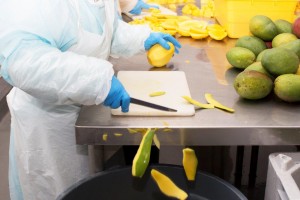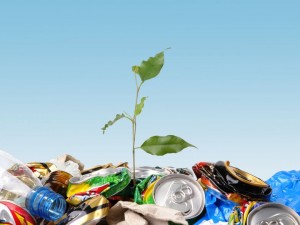Tag: food-waste
November 24, 2020
By Pamela Berns
Covid-19 has created disruptions in all aspects of our lives, challenging us to change our habits and lifestyles, only to have to change them yet again. “Pivot” and “shift” have become the buzzwords of 2020, and although it’s been exhausting, one might even say we’ve gotten enough practice to be become masters of behavior change. This holiday season is no different, unfolding like no other in memory, demanding that we revisit some of our most fundamental practices and revise our most cherished rituals. With social distancing and the unfortunate winter surge, more families are opting to go smaller at home. They are improvising strategies for virtual get togethers and seeking meaning in unfamiliar ways, hoping to compensate at least a little for lost hugs and after dinner walks.

If COVID-19 is calling on us to change the way we eat together, it also necessitates greater mindfulness in the way we plan and prepare and our meals. Smaller guest lists mean buying and cooking less, and ultimately wasting less. Many studies have shown that how we produce and consume food is one of the biggest drivers of our planet’s deteriorating health, wrote
Brent Loken, Global Food Lead Scientist with the World Wildlife Federation (WWF) on October 8.
(more…)
May 24, 2017
by Sunitha Sarveswaran

Most people look at strawberry tops or carrot peels and throw them away, without realizing the myriad of other uses these scraps could provide. According to the EPA, the most preferred use for food and organics is human consumption. The least preferred uses are landfill and incineration. The GreenHomeNYC April Forum on Sustainable Food Systems featured a panel of five experts who spoke about the different strategies communities, businesses, and building owners can employ in order to limit or eliminate their organic waste footprint.
Communities can make a difference
According to the
New York City Department of Sanitation, more than a third of all waste generated by New York City residents is organic waste. Michael Hurwitz, the Director of the
GreenMarket Program and GrowNYC, spoke about how consumers can make a large impact on the organic waste footprint of New York City. Greenmarket was founded in 1976 with two main goals: to keep local farms viable and to ensure New Yorkers have unlimited access to fresh, local produce. Hurwitz discussed how one third of all food grown goes unharvested due to the cosmetic preferences of vendors. GreenMarket takes this unwanted produce and sells it at their local markets. Greenmarket’s passion is educating consumers on how to prepare food so that every part is used and scraps are not wasted. Greenmarket provides recipes, canning presentations and workshops to help consumers minimize their food waste and stretch their dollar.
(more…)
January 2, 2016
by Tamanna Virmani

Idaho potatoes, a staple of the American diet, make a long journey from farm to plate. Physically and literally, the last stop on the train for this American native is
Baldor Specialty Foods at Hunts Point Avenue in the Bronx. Hidden away in full view at Hunts Point is a sustainability success story that few know about but most are connected to, at least indirectly.
(more…)
September 30, 2015
by Tamanna Virmani

All of us living or working in New York City recognize and admire the fact that the city is a trailblazer in many areas. However, waste management in general, and organics recycling in particular, have been challenging issues for the city – issues needing a trailblazing spirit to establish best practices for the future. A recent panel discussion hosted by the U.S. Green Building Council explored the future of waste management in New York City.
Led by moderator Clare Miflin of Kiss + Cathcart Architects, experts Christina Grace of Foodprint Group and Brett Mons from the New York City Department of Sanitation (DSNY) discussed food waste in light of Mayor DeBlasio’s
OneNYC plan. OneNYC, an ambitious plan to make New York the most sustainable big city in the world, encompasses a number of initiatives, one of which is to send zero waste to landfills by 2030. This will require expansion of the New York City organics program to serve all New Yorkers by the end of 2018 and a 90% reduction in commercial waste disposal by 2030. In order to achieve these goals, major changes are needed, along with active involvement from residents, businesses, the building community and the Department of Sanitation.
(more…)
 If COVID-19 is calling on us to change the way we eat together, it also necessitates greater mindfulness in the way we plan and prepare and our meals. Smaller guest lists mean buying and cooking less, and ultimately wasting less. Many studies have shown that how we produce and consume food is one of the biggest drivers of our planet’s deteriorating health, wrote Brent Loken, Global Food Lead Scientist with the World Wildlife Federation (WWF) on October 8. (more…)
If COVID-19 is calling on us to change the way we eat together, it also necessitates greater mindfulness in the way we plan and prepare and our meals. Smaller guest lists mean buying and cooking less, and ultimately wasting less. Many studies have shown that how we produce and consume food is one of the biggest drivers of our planet’s deteriorating health, wrote Brent Loken, Global Food Lead Scientist with the World Wildlife Federation (WWF) on October 8. (more…)
 Most people look at strawberry tops or carrot peels and throw them away, without realizing the myriad of other uses these scraps could provide. According to the EPA, the most preferred use for food and organics is human consumption. The least preferred uses are landfill and incineration. The GreenHomeNYC April Forum on Sustainable Food Systems featured a panel of five experts who spoke about the different strategies communities, businesses, and building owners can employ in order to limit or eliminate their organic waste footprint.
Communities can make a difference
According to the New York City Department of Sanitation, more than a third of all waste generated by New York City residents is organic waste. Michael Hurwitz, the Director of the GreenMarket Program and GrowNYC, spoke about how consumers can make a large impact on the organic waste footprint of New York City. Greenmarket was founded in 1976 with two main goals: to keep local farms viable and to ensure New Yorkers have unlimited access to fresh, local produce. Hurwitz discussed how one third of all food grown goes unharvested due to the cosmetic preferences of vendors. GreenMarket takes this unwanted produce and sells it at their local markets. Greenmarket’s passion is educating consumers on how to prepare food so that every part is used and scraps are not wasted. Greenmarket provides recipes, canning presentations and workshops to help consumers minimize their food waste and stretch their dollar.
(more…)
Most people look at strawberry tops or carrot peels and throw them away, without realizing the myriad of other uses these scraps could provide. According to the EPA, the most preferred use for food and organics is human consumption. The least preferred uses are landfill and incineration. The GreenHomeNYC April Forum on Sustainable Food Systems featured a panel of five experts who spoke about the different strategies communities, businesses, and building owners can employ in order to limit or eliminate their organic waste footprint.
Communities can make a difference
According to the New York City Department of Sanitation, more than a third of all waste generated by New York City residents is organic waste. Michael Hurwitz, the Director of the GreenMarket Program and GrowNYC, spoke about how consumers can make a large impact on the organic waste footprint of New York City. Greenmarket was founded in 1976 with two main goals: to keep local farms viable and to ensure New Yorkers have unlimited access to fresh, local produce. Hurwitz discussed how one third of all food grown goes unharvested due to the cosmetic preferences of vendors. GreenMarket takes this unwanted produce and sells it at their local markets. Greenmarket’s passion is educating consumers on how to prepare food so that every part is used and scraps are not wasted. Greenmarket provides recipes, canning presentations and workshops to help consumers minimize their food waste and stretch their dollar.
(more…)
 Idaho potatoes, a staple of the American diet, make a long journey from farm to plate. Physically and literally, the last stop on the train for this American native is Baldor Specialty Foods at Hunts Point Avenue in the Bronx. Hidden away in full view at Hunts Point is a sustainability success story that few know about but most are connected to, at least indirectly.
(more…)
Idaho potatoes, a staple of the American diet, make a long journey from farm to plate. Physically and literally, the last stop on the train for this American native is Baldor Specialty Foods at Hunts Point Avenue in the Bronx. Hidden away in full view at Hunts Point is a sustainability success story that few know about but most are connected to, at least indirectly.
(more…)
 All of us living or working in New York City recognize and admire the fact that the city is a trailblazer in many areas. However, waste management in general, and organics recycling in particular, have been challenging issues for the city – issues needing a trailblazing spirit to establish best practices for the future. A recent panel discussion hosted by the U.S. Green Building Council explored the future of waste management in New York City.
Led by moderator Clare Miflin of Kiss + Cathcart Architects, experts Christina Grace of Foodprint Group and Brett Mons from the New York City Department of Sanitation (DSNY) discussed food waste in light of Mayor DeBlasio’s OneNYC plan. OneNYC, an ambitious plan to make New York the most sustainable big city in the world, encompasses a number of initiatives, one of which is to send zero waste to landfills by 2030. This will require expansion of the New York City organics program to serve all New Yorkers by the end of 2018 and a 90% reduction in commercial waste disposal by 2030. In order to achieve these goals, major changes are needed, along with active involvement from residents, businesses, the building community and the Department of Sanitation. (more…)
All of us living or working in New York City recognize and admire the fact that the city is a trailblazer in many areas. However, waste management in general, and organics recycling in particular, have been challenging issues for the city – issues needing a trailblazing spirit to establish best practices for the future. A recent panel discussion hosted by the U.S. Green Building Council explored the future of waste management in New York City.
Led by moderator Clare Miflin of Kiss + Cathcart Architects, experts Christina Grace of Foodprint Group and Brett Mons from the New York City Department of Sanitation (DSNY) discussed food waste in light of Mayor DeBlasio’s OneNYC plan. OneNYC, an ambitious plan to make New York the most sustainable big city in the world, encompasses a number of initiatives, one of which is to send zero waste to landfills by 2030. This will require expansion of the New York City organics program to serve all New Yorkers by the end of 2018 and a 90% reduction in commercial waste disposal by 2030. In order to achieve these goals, major changes are needed, along with active involvement from residents, businesses, the building community and the Department of Sanitation. (more…)
